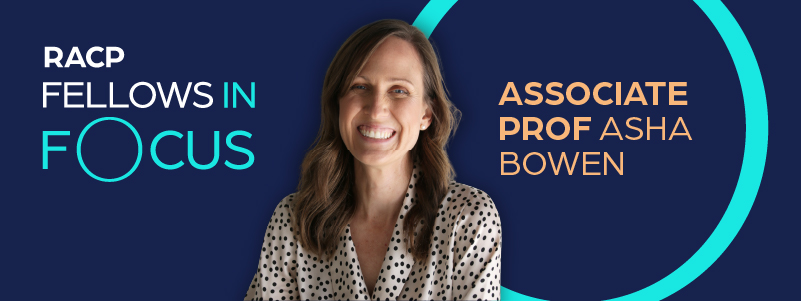RACP Fellows in Focus: A/Prof Asha Bowen
Date published:
12 Jul 2021

“Ultimately, I always loved paediatrics, loved working with kids and family, and figured out that about 40 to 50 per cent of the global population was under 15 years of age. So, it was a good field to choose if I wanted to make a difference. Being a paediatrician was always on my radar and I didn't love other aspects of medicine nearly as much. Once I became a paediatrician, I sub-specialised in infectious diseases. Now, I'm a sub-specialist and delve into the variety of infections that affect children,” reflected Associate Professor Asha Bowen, on why she pursued a career as a paediatric infectious disease specialist.
Asha is a clinician-scientist working at Perth Children’s Hospital. She is Head of Skin Health at the Telethon Kids Institute and in 2015 was awarded her PhD at the Menzies School of Health Research in Darwin. She is the lead investigator for the SToP trial to ‘see, treat and prevent’ skin infections, a large, randomised trial in the Kimberley, Western Australia. “I looked at the impact of skin infections and found that Aboriginal children living in remote communities have the highest-burden in the world. Once I figured that out, I really didn't want to stop. How do we address these problems and what is the research agenda that is needed to reduce that burden of skin infections? The goal is to get it to be no more than anyone else, any other children living in Australia, remote or urban.”
More recently, Asha and her team launched the inaugural National Healthy Skin Guideline to guide clinicians in the recognition and evidence-based treatment of skin infection. Furthermore, Asha is the Chair of the Australian and New Zealand Paediatric Infectious Diseases (ANZPID) Committee of the Australasian Society of Infectious Diseases (ASID), a Council member of ASID and Deputy Chair of the ASID clinical research network.
“Listening and curiosity” have been lynchpins in her success as a medical practitioner.
“You have to figure out how to either diagnose a patient's infection or treat their infection.”
“Quite often, you're dealing with limited pieces of information, and in children, frequently, the studies have not been done to work out what treatments work and what doesn't. Curiosity should inform the diagnosis,” she continued.
Asha remains a critical member for the RACP’s COVID-19 Expert Reference Group, and was invited in as she is Co-Chair of COVID-19 Living Evidence Taskforce Paediatric and Adolescent Panel and the ANZPID Chair.
“I get to have a role in leading the pediatric infectious diseases specialists and then that opens those opportunities to be involved in a national College COVID-19 Expert Reference Group. That’s an extra thing that I've incorporated in 2020 and 2021 and seeing those opportunities, to influence policy and advocacy and speak for and on behalf of your colleagues, is a great thing.”
For anyone looking to follow in Asha’s footsteps, “Find really good mentors to guide you in becoming a clinician-scientist. I cannot recommend a career as a clinician-scientist more highly. I love being able to treat patients and consider new questions to answer that require research at the same time. New questions and thinking about modes of research that could answer those questions keep the clinical work fresh and alive. There's something quite reassuring, something that's enjoyable, when you see the research that you've done and then seeing its influence on guidelines across the country. When someone prescribes medicine, because you did the research to answer that question, I think that’s pretty cool,” advised Asha.
“Not everyone will want to be a clinician-scientist or a pediatric infectious disease specialist, but it is a wonderful career choice that I love. It gives you opportunities to connect internationally, potentially do work internationally and influence. I never thought that infectious diseases specialists would be media superstars, but it really has re-positioned many with a voice in COVID-19. We always thought we were kind of the super-nerds of the College, but it turns out that maybe we have some skills that are useful.”
Looking to the future, Asha shared, “I would like to see that Aboriginal children in our country are no more likely to have skin infections and the sequelae of those, such as rheumatic fever, rheumatic heart disease or sepsis than any other children. Working in partnership with Aboriginal people and communities to achieve this, and listening for guidance and opportunities to include a strengths based approach is important. Furthermore, I eagerly await Aboriginal people with equal opportunities, to have a voice to parliament, that the Uluru Statement From the Heart gets accepted because I think that that's the crux of when we will see these health changes happen. I sometimes struggle with the political, the health and how it all fits together. You have to advocate, you've got to think deeply about the suffering and the disadvantage that has been imposed in order to understand the challenges that you're working together with Aboriginal people to address.”